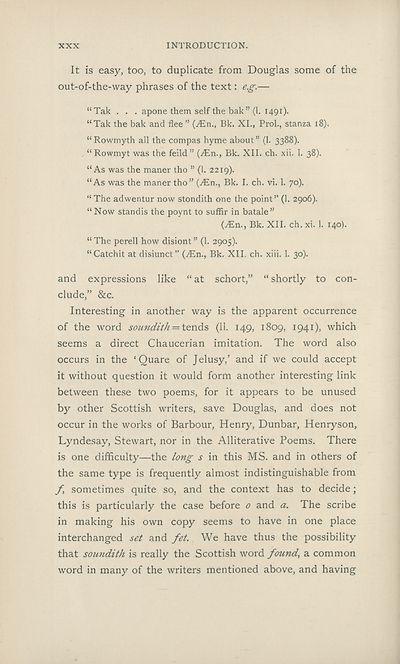Download files
Complete book:
Individual page:
Thumbnail gallery: Grid view | List view

XXX
INTRODUCTION.
It is easy, too, to duplicate from Douglas some of the
out-of-the-way phrases of the text: e.g.—
“Tak . . . apone them self the bak ” (1. 1491).
“Tak the bak and flee ” (y£n., Bk. XL, Prol., stanza 18).
“Rowmyth all the compas hyme about” (1. 3388).
“Rowmyt was the feild” (z£n., Bk. XII. ch. xii. 1. 38).
“As was the maner tho ” (1. 2219).
“As was the maner tho” (^En., Bk. I. ch. vi. 1. 70).
“The adwentur now stondith one the point” (1. 2906).
“Now standis the poynt to suffir in batale”
(j4in., Bk. XII. ch. xi. 1. 140).
“The perell how disiont” (1. 2905).
“Catchit at disiunct ” (JEn., Bk. XII. ch. xiii. 1. 30).
and expressions like “ at schort,” “ shortly to con¬
clude,” &c.
Interesting in another way is the apparent occurrence
of the word soundith —tends (11. 149, 1809, 1941), which
seems a direct Chaucerian imitation. The word also
occurs in the ‘ Quare of Jelusy,’ and if we could accept
it without question it would form another interesting link
between these two poems, for it appears to be unused
by other Scottish writers, save Douglas, and does not
occur in the works of Barbour, Henry, Dunbar, Henryson,
Lyndesay, Stewart, nor in the Alliterative Poems. There
is one difficulty—the long s in this MS. and in others of
the same type is frequently almost indistinguishable from
f sometimes quite so, and the context has to decide;
this is particularly the case before 0 and a. The scribe
in making his own copy seems to have in one place
interchanged set and fet. We have thus the possibility
that soundith is really the Scottish word found, a common
word in many of the writers mentioned above, and having
INTRODUCTION.
It is easy, too, to duplicate from Douglas some of the
out-of-the-way phrases of the text: e.g.—
“Tak . . . apone them self the bak ” (1. 1491).
“Tak the bak and flee ” (y£n., Bk. XL, Prol., stanza 18).
“Rowmyth all the compas hyme about” (1. 3388).
“Rowmyt was the feild” (z£n., Bk. XII. ch. xii. 1. 38).
“As was the maner tho ” (1. 2219).
“As was the maner tho” (^En., Bk. I. ch. vi. 1. 70).
“The adwentur now stondith one the point” (1. 2906).
“Now standis the poynt to suffir in batale”
(j4in., Bk. XII. ch. xi. 1. 140).
“The perell how disiont” (1. 2905).
“Catchit at disiunct ” (JEn., Bk. XII. ch. xiii. 1. 30).
and expressions like “ at schort,” “ shortly to con¬
clude,” &c.
Interesting in another way is the apparent occurrence
of the word soundith —tends (11. 149, 1809, 1941), which
seems a direct Chaucerian imitation. The word also
occurs in the ‘ Quare of Jelusy,’ and if we could accept
it without question it would form another interesting link
between these two poems, for it appears to be unused
by other Scottish writers, save Douglas, and does not
occur in the works of Barbour, Henry, Dunbar, Henryson,
Lyndesay, Stewart, nor in the Alliterative Poems. There
is one difficulty—the long s in this MS. and in others of
the same type is frequently almost indistinguishable from
f sometimes quite so, and the context has to decide;
this is particularly the case before 0 and a. The scribe
in making his own copy seems to have in one place
interchanged set and fet. We have thus the possibility
that soundith is really the Scottish word found, a common
word in many of the writers mentioned above, and having
Set display mode to: Large image | Zoom image | Transcription
Images and transcriptions on this page, including medium image downloads, may be used under the Creative Commons Attribution 4.0 International Licence unless otherwise stated. ![]()
| Publications by Scottish clubs > Scottish Text Society publications > New series > Lancelot of the Laik > (38) |
|---|
| Permanent URL | https://digital.nls.uk/107122632 |
|---|
| Description | A collection of over 100 Scottish texts dating from around 1400 to 1700. Most titles are in Scots, and include editions of poetry, drama, and prose by major Scottish writers such as John Barbour, William Dunbar, Gavin Douglas, and George Buchanan. Edited by a key scholarly publisher of Scotland's literary history, and published from the late 19th century onwards by the Scottish Text Society. Available here are STS series 1-3. |
|---|

